American Studies, Environmental Studies, Panels, Regional Studies, Student Engagement
It's Getting Hot in Here: Changing Climate Change
On November 21, 2021, GU-Q students presented their research on international systems for managing global climate change at a hybrid CURA Lunch Talk titled, “It’s Getting Hot in Here: Changing Climate Change.” Six first-year students represented the group work of their classmates and covered topics on: the Intergovernmental Panel on Climate Change (IPCC), IPCC 6th assessment report, the United Nations Framework Convention on Climate Change (UNFCCC) and Council of the Parties (COPs), Qatar’s position on climate change management, and COP26.
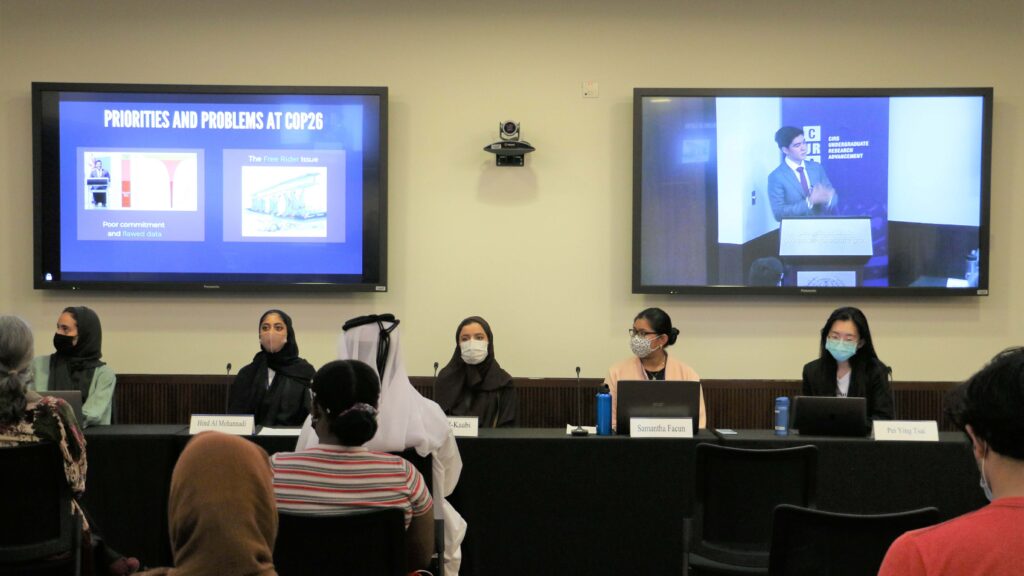
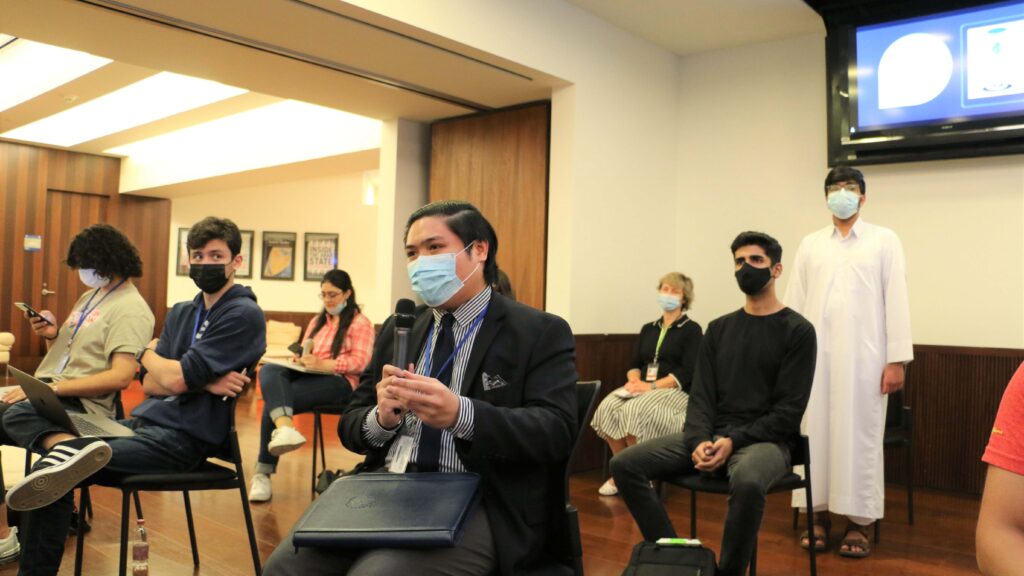
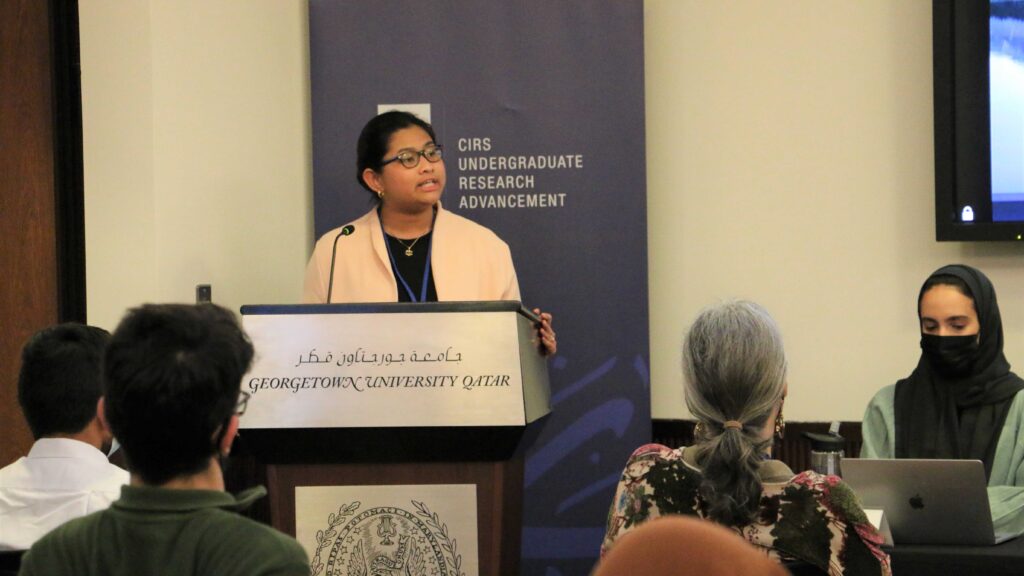
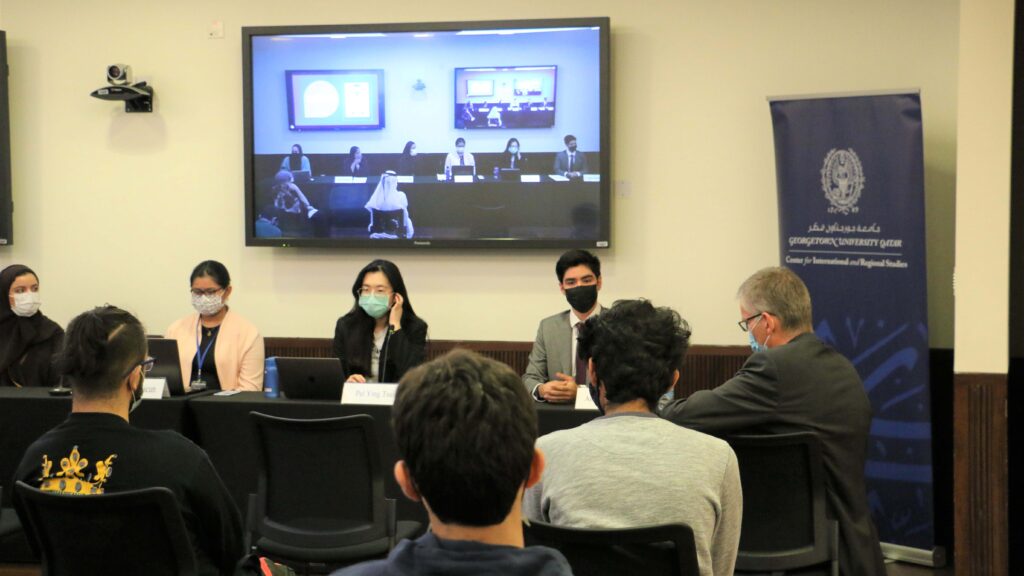
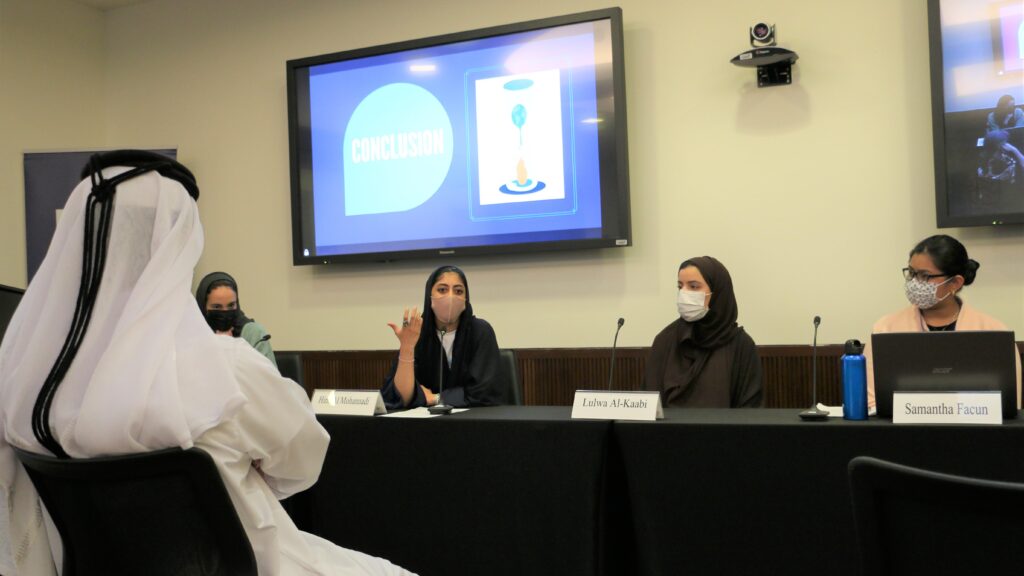
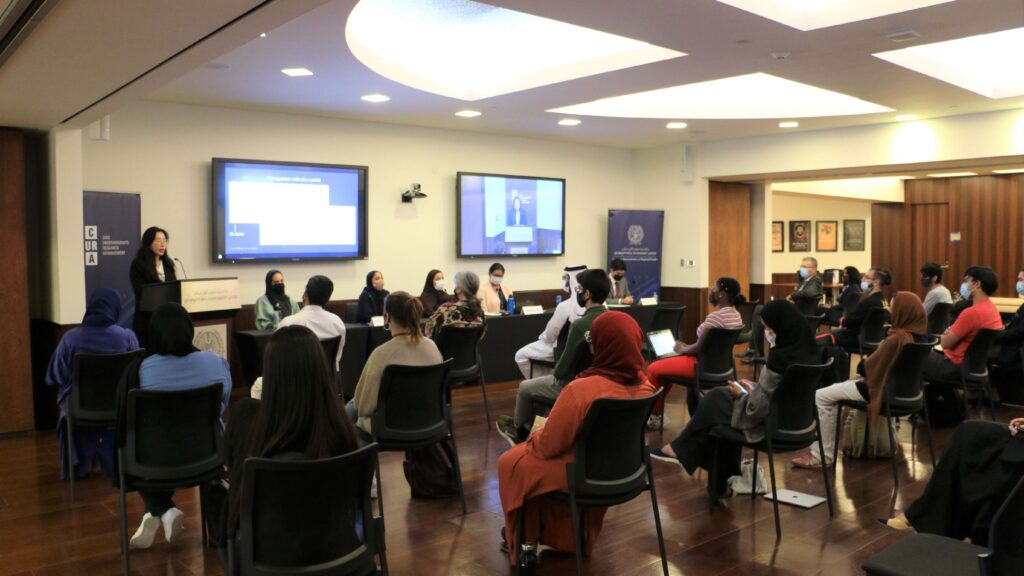
The IPCC was described by Hind Al-Mohannadi (class of 2025) as the “Guardian of Climate Science.” As such, the IPCC produces assessment reports every five to eight years. The IPCC is a coalition of scientists and governments. The core scientists of the IPCC review all of the published climate science literature and produce assessment reports to highlight the areas of consensus in the science. They focus on studies that have a level of consensus of 99 percent or greater, which means the hypothesized outcome of a study is virtually certain. Maya Al-Kawari (class of 2025) presented the findings of the last IPCC assessment report (Assessment Report 6, Working Group I). She highlighted a statement of the report according to which it is “unequivocal that human influence has warmed the atmosphere, ocean and land.” She then showed a chart that illustrated the near linear relationship between the cumulative carbon dioxide emissions and global warming for five hypothetical carbon-emission scenarios until the year 2050. The chart shows that the global temperature will undoubtedly increase, it is only the temperature range that remains to be seen based on how effective actions to reduce carbon emissions are taken now (see figure 1 below).
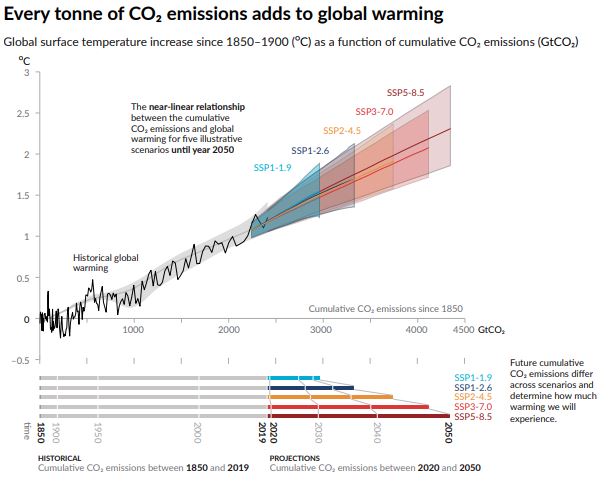
Another international body relating to climate change is the United Nations Framework Convention on Climate Change (UNFCCC). Samantha Facun (class of 2025) explained that this is a monitoring and reviewing group consisting of 197 parties, including all UN member states and the European Union (EU). The COP is an annual gathering of the parties in which they try to work towards joint agreements or protocols to address the impacts of climate change. For example, the Kyoto Protocol, adopted in 1997 and fully ratified in 2005 aimed to reduce greenhouse gas emissions by five percent over five years. The Paris Agreement (2015) is another example of an outcome from a COP, in which signatories pledged to limit warming to no more than two degrees Celsius, with a preferred temperature of 1.5 degrees Celsius. Some parties form alliances to better lobby for their particular interests, for example, the Alliance of Small Island States, the High Ambition Coalition, and the Arab States. Unfortunately, data shows that the agreements that come out of COP meetings are very limited in their effectiveness (see figure 2 below).
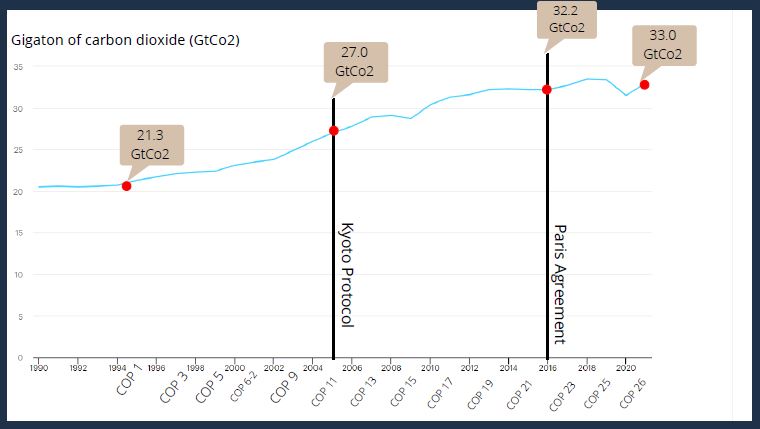
Moving further in to the view of Qatar in particular, Pei Ying Tsai (class of 2025) presented an overall picture of Qatar’s position toward the Paris Agreement and the Kyoto Protocol, to which Qatar is a signatory. Consistent with global trends, Qatar’s greenhouse emissions did not decrease after the Kyoto Protocol or Paris Agreement came into effect. Qatar, a small state, ranks number thirty-eight globally in amount of carbon dioxide emitted based on its territorial size. However, Qatar ranks number one globally in terms of carbon dioxide emissions per capita. On the positive side, relative to the rest of the GCC, Qatar’s climate debt (the debt owed by developed countries to developing countries for the damage caused by their disproportionately large contributions to climate change) has decreased significantly more than the other Gulf countries. In the recent COP26, Qatar pledged to reduce greenhouse gas emissions by twenty-five percent by 2030 – a mere nine years from now. It is planning to do this through significant actions taken in the areas of infrastructure and transport, water and waste management, and awareness.
Concluding the presentation, Angelo Castiello (class of 2025), highlighted the limitations of COP26 and the international systems for managing climate change. Climate change faces a notorious “free rider” problem, with poor commitment from the greatest emitters of greenhouse gases, which are also the richest countries. The COP delegates are countries, but also industries. Notably, the COP26 delegates associated with fossil fuel industries outnumbered the national delegations (see figure 3 below).
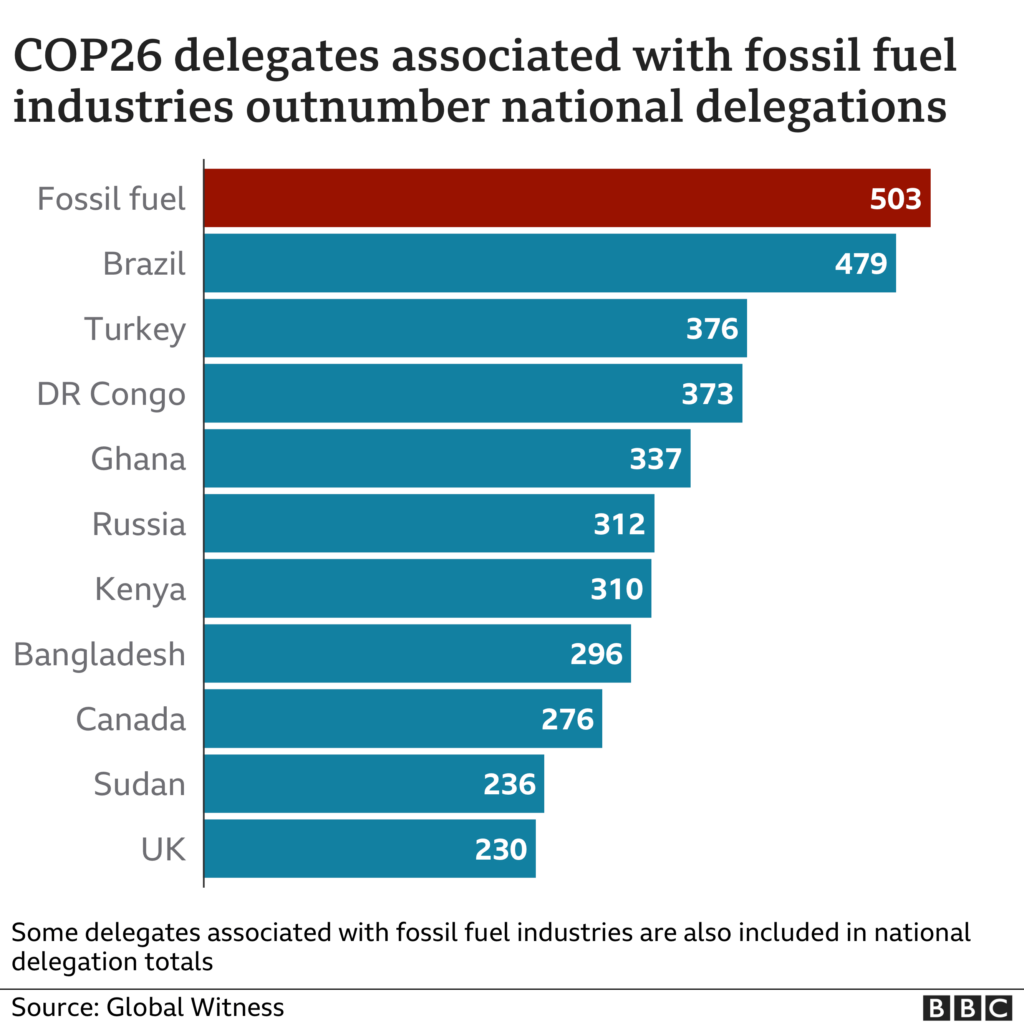
The overall takeaway message from the event is that despite the international attention towards and efforts to assuage global warming and the impacts of climate change, international agreements and governmental proclamations are not going to be enough. We as individuals must make the collective decisions in our daily lives that have potential for lasting impact.
Article by: Elizabeth Wanucha, CIRS Operations Manager